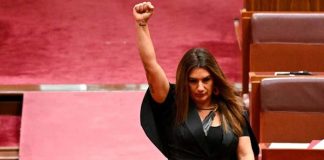The Labor government has given nineteen businesses a seat on a roundtable that will operate behind the scenes of the new carbon price committee. The government’s press release said this will “ensure that the views of the business community are front and centre”.
It was Labor’s concern to woo big business that led to the useless Carbon Pollution Reduction Scheme (CPRS), but Gillard remains determined to keep the fossil fuel industry on side, whatever the cost to the climate.
Labor formed the committee in their deal with The Greens after the election. The Greens have remained uncritical of Labor’s recent announcement—in fact, Christine Milne, The Greens deputy leader, has as much as welcomed it, saying “so many businesses around the country understand the need and benefits of putting a price on carbon.” Bob Brown lamented The Greens’ exclusion from the roundtable—because, “If the Greens aren’t there how do you get the business perspective?”
But the willingness of big business to shape climate policy in their interests is nothing to encourage. The announcement only confirms that The Greens’ strategy of lobbying Labor for a carbon price is no solution for winning renewables.
Business interests
Oil, coal and gas giants Rio Tinto, Shell, BHP Billiton and Woodside Petroleum have been given seats on the roundtable, alongside energy suppliers AGL and Origin. Toyota, Qantas and BlueScope Steel also have places. These businesses profit from fossil fuels and their role in advising the carbon price committee will be to extract compensation for themselves while ensuring their own long-term profitability.
Many of the same companies on the new roundtable extracted hundreds of millions of dollars out of the CPRS. Rio Tinto and BlueScope Steel were the two biggest recipients of this ‘compensation’. Don Voelte, the head of Woodside, Australia’s biggest oil and gas company, was an outspoken critic of Rudd’s CPRS—because he wanted more compensation for his industry. In the end, Rudd promised $600 million for liquefied natural gas plants (LNG) as well as extra permits.
Unsurprisingly, Woodside is pushing gas as an alternative to coal-fired power. But gas, like coal, is fossil fuel. A recent report by The Greens has found that if all the proposed gas plants in Western Australia go ahead, they will add 60 million tonnes of CO2 per year to the atmosphere. That would nearly double Western Australia’s emissions.
Climate Minister Greg Combet, who is co-chairing the roundtable with Wayne Swan, supports the expansion of gas. He has said that a carbon price is needed to generate investment in base-load gas plants.
Combet is also at pains to assure the coal industry that the Labor government will not challenge them. He continues to boast of the government’s $2 billion investment in research into mythical clean coal.
Labor does not want investment in real renewable technologies, like concentrated solar thermal or wind power. Labor wants a carbon price so they can be seen to be doing something—but at the same time, they are prepared to do nothing that will really challenge the industries responsible for climate change.
Carbon pricing
Carbon pricing, whether in the form of an emissions trading scheme or a tax, has always been about protecting markets and the neo-liberal agenda while appearing to act on climate change.
Ross Garnaut, who will be advising the committee and originally advised Rudd Labor on climate policy, has said, “Australia’s prime asset in responding [to climate change] is the prosperous, open and flexible market-oriented economy.” He warned in his original report to the Rudd government, “Don’t pick winners. Fix market failures” and says the alternative to “mandating, licensing or banning” is a market approach where “consumers are left to choose whether, when and how to change from high to low carbon-intensive products.” What he is saying is that instead of actually regulating pollution or publicly investing in renewable energy, we should leave it up to the free market to decide. Judging by the experience of carbon prices overseas, this will mean nothing except more emissions and higher prices.
More than ever, it’s an approach the climate movement must reject.
The Greens were caught off guard by the announcement of the roundtable. They had no influence over the decision and were denied a position at the table. Their presence on the carbon price committee has not stopped Gillard from running the show. Their approach has led them down a dead end.
The alternative lies outside the committee and outside parliament—in a movement that challenges the power of big business, instead of accommodating to it.
Erima Dall





